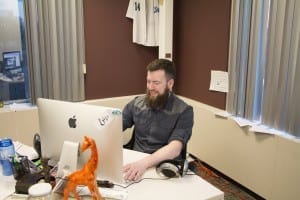
What does the union plan to accomplish this year?
The Carillon’s news writer Derek Cameron sat down with newly reelected University of Regina Students’ Union (URSU) President Devon Peters to discuss the union’s financial plans, URSU’s activities, the U-Pass and more. Read below for his answers. Also, be sure to come out to URSU’s annual general meeting (AGM) on April 15, 2015 in the Riddell Multi-purpose room at noon.
Derek Cameron: What are your detailed financial plans for the University of Regina Students’ Union (URSU)?
Devon Peters: The direction for next year is still in development. We are having a strategic planning session early on in the term and doing some executive planning, and we’re going to be developing our plans for the next few years. Broadly speaking, we’d like to keep the financial outlook good and spend money where it makes the most impact.
Some concerns have been raised around URSU’s current finical situation. For more coverage search our ‘Minutemen’ column.
DC: What does URSU do in the spring and summer semesters?
DP: A lot of things, it’s just very inward. During fall and winter semesters, we are very much involved, we spend a lot of effort working with students, promoting our services and promoting elections. In the summer, our work is introverted; we look at policy, we redevelop it, we look at staffing. We really start to set out our direction for the entire year, like the strategic plan, and try to get as much done before the tsunami of work hits us in the fall.
DC: What’s next for the U-Pass?
DP: I’m currently in talks with the rest of the executive to see how we will move ahead on that front. Presumably, there will be negotiations taking place as soon as possible.
DC: Are there further ideas to improve parking?
DP: We managed to get the board of governors to approve a new 230 spot parking lot on the north side of campus. This will alleviate some of the parking woes that students in [the language institute] and students accessing the library have been feeling. Further to that, we are always talking to the university on how to improve parking, since it is such an issue for students.
Is parking that bad on Campus? We don’t think it is, what are your thoughts?
DC: What are your plans for organizational change?
DP: I intend to continue to develop more policy with the new executive. I think that strong policy is related to a strong foundation for an organization like this. An organization that has strong policy —It may feel cookie cutter in some ways — but it creates an organization that can be easily managed and easily run. And that’s a very important thing when you have students who are coming in for a year. I worked with URSU for four years prior to assuming presidency and it still took me time to get adjusted to the role, so I think policy will help make that transition process as smooth as possible. It makes clear the purpose of this organization.
DC: Do you have examples of this?
DP: We have rewritten our financial policy and so I’m laying out how to create a budget, a balanced one, even a positive one. It wasn’t something that was written down before. We’re about to pass a policy around meetings, how do you conduct a meeting, what is optional what is not, how do we report those things. It addresses how we address decisions to the Carillon or our accounting department. All of these policies seem pretty obvious, but it takes a fair amount of coordination to put these in place so that the next person doesn’t have to figure it out again, but it will make their life easier.
DC: You talked about reporting, what’s in the policy?
DP: Ensuring meeting minutes are up on time, ensuring that the Carillon knows when meetings are so you aren’t able to miss out on them. We haven’t made a formal decision, but we’d like to upgrade so we can do live recording. I would like to do live recording, but this organization has a lot of infrastructure needs right now. Whether it’s in the Owl or the walls, I want things like that fixed up. So, purchasing that equipment will really depend on the new executive and the new board.
DC: You talked about tuition increases in your campaign. What does the recent budget tell us about keeping tuition increases low?
DP: It’s always possible to keep tuition increases low, but I think barring something crazy, it would be foolish to assume there isn’t going to be one. The president of the university has already acknowledged that she’s going to have to cut staff, and that’s a hard thing to say and it’s detrimental to our experience as students. We have to fight things [like staff cuts], while keeping in mind we have to worry about our own pocketbook, too. And one of the ways we can do that is by voting. There are elections upcoming, and as long as 70 per cent of our grandparents are voting and only 30 per cent of us are, we’re going to see status quo and investment in senior care. As students, we have to express our self-interest, otherwise it will get washed away. Whether or not we feel like our vote makes a difference it does. Getting up the student vote will be a priority for this organization.










